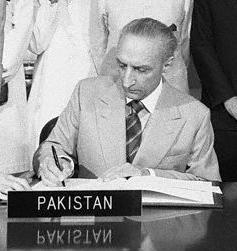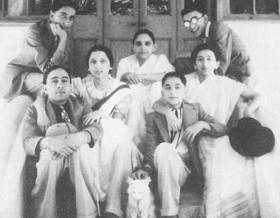 As many people guessed correctly, the person in our most recent ATP Quiz here was a young Sahabzada Yaqub Khan, former foreign minister of Pakistan.
As many people guessed correctly, the person in our most recent ATP Quiz here was a young Sahabzada Yaqub Khan, former foreign minister of Pakistan.
Yaqub Khan was a unique and multi-talented high-achiever – general, statesman, diplomat, intellectual. He was born in 1920 in the Royal Family of Nawabs of Rampur, India. He first joined the Indian Army and when Pakistan got independence, he migrated to Pakistan and continued to serve in Pakistan Army. While serving in Pakistan Army he rose to the rank of a Leutenant General and served in East Pakistan as the Chief of General Staff, Commander Eastern Command. For a brief period of 1 week he also became the Governor of East Pakistan.
After retiring from Army in 1972 Sahibzada Yaqub Khan served as the Ambassador of Pakistan in USA, USSR and France. From 1982 onwards he was designated as Pakistan’s Foreign Minister in different Governments. Between 1992-97 he also served as United Nations Secretary General’s Special Representative for the Western Sahara.
Sahabzada Yaqub Khan is also the founding chairman of Aga Khan University Board of Trustees. In June 2005 Aga Khan University Press published a book called Strategy, Diplomacy, Humanity on the life and work of Sahabzada Yaqub-Khan.
Above all, Shaibzada Yaqub Khan was a “personality” in the true sense of the world. In 2005 Abbas Raza wrote a fascinating profile of Yaqoob Khan in the blog Three Quarks Daily, in which he describes Sahibzada Yaqub as “probably the most remarkable man I have ever met.” His account of his meeting with Sahibzada Yaqoob Khan tells much about the man as well as the icon:
The first time that I met Sahabzada Yaqub Khan about six years ago, he was in Washington and New York as part of a tour of four or five countries (America, Russia, China, Japan, etc.) relations with which are especially important to Pakistan… I had heard and read much about Sahabzada Yaqub and knew his reputation for fierce intellect and even more intimidating, had heard reports of his impatience with and inability to suffer fools, so I was nervous when I walked in. Over the next couple of hours I was blown away: Sahabzada Yaqub was not much interested in talking about politics, and instead, asked about my doctoral studies in philosophy. It was soon apparent that he had read widely and deeply in the subject, and knew quite a bit about the Anglo-American analytic philosophy I had spent the previous five years reading. He even asked some pointed questions about aspects of philosophy which even some graduate students in the field might not know about, much less laymen. Though we were interrupted by a series of phone calls from the likes of Henry Kissinger wanting to pay their respects while Sahabzada Yaqub was in town, we managed to talk not just about philosophy, but also physics (he wanted to know more about string theory), Goethe (SYK explained some of his little-known scientific work, in addition to quoting and then explicating some difficult passages from Faust), the implications of Gödel’s incompleteness theorem, and Urdu literature, of which Sahabzada Yaqub has been a lifelong devotee.
I left late that night dazzled by his brilliance, and elated by his warmth and generosity. Sahabzada Yaqub listens more than he speaks, but when he does speak, he is a raconteur extraordinaire. Since then, I have been fortunate enough to get to know him well, and have spent many a rapt hour in his company. On my last trip to Islamabad, he and his wife and [his son] had me and my wife Margit over for dinner, where upon learning that Margit is from Italy, Sahabzada Yaqub spoke with her in Italian. Then, realizing that she is from the South Tyrol (the German-speaking part of Italy near the Austrian border), he spoke to her in German, giving us a fascinating mini-lecture on German translations of Shakespeare. I can picture him now, emphatically declaiming “Sein oder nicht sein. Das ist hier die frage.”
… Though he has always been fiercely protective of his privacy, politely refusing to write his memoirs despite great public demand (including entreaties over the last few years from me), Sahabzada Yaqub Khan has recently allowed some of his writings to be collected into book form: Strategy, Diplomacy, Humanity, compiled and edited by Dr. Anwar Dil, had its launch earlier this month at a ceremony at the Agha Khan University in Karachi.
…Among other things, Sahabzada Yaqub Khan is a true polyglot: he can speak, read and write somewhere between 6 and 10 languages. While he was governor of East Pakistan, he learned Bengali and delivered public addresses in it, which went a long way toward assuaging their concerns of cultural dominance by West Pakistan. He is also a stylishly impeccable dresser (he was voted best-dressed several years in a row by the Washington diplomatic corps). My greatest joy in his company, however, remains his inimitable explications of the deeper philosophical implications buried in Ghalib’s couplets, of which he has been a longtime and enthusiastic student. In short, he is a man with many and diverse qualities.
 Before formally ending the post I want to share couple of photos of Sahabzada Yaqub Khan. The photo to the left is circa 1922 and Yaqub Khan is sitting in the center. His brother Yousuf is on his right and brother Younus on his left.
Before formally ending the post I want to share couple of photos of Sahabzada Yaqub Khan. The photo to the left is circa 1922 and Yaqub Khan is sitting in the center. His brother Yousuf is on his right and brother Younus on his left.
The photo to the right below is Sahabzada Yaqub Khan in a group of cousins and siblings.
 This photo is circa 1936 and was taken in Masori, India. People sitting Clockwise in the photo are Lady Abdus Samad Khan (mother of Yaqub Khan), Sahabzada Yousuf Khan, Jahan Ara Habibullah (sister), Sahabzada Yaqub Khan, Fakhra (sister), Masood-uz-Zafar (brother in law) and Sahanzada Younus Khan.
This photo is circa 1936 and was taken in Masori, India. People sitting Clockwise in the photo are Lady Abdus Samad Khan (mother of Yaqub Khan), Sahabzada Yousuf Khan, Jahan Ara Habibullah (sister), Sahabzada Yaqub Khan, Fakhra (sister), Masood-uz-Zafar (brother in law) and Sahanzada Younus Khan.




















































Abbas Raza, whose post/quote covers much of this post actually also added in the start of the quoted paragraph that:
He had come as President Musharraf’s special envoy to reassure these governments in the wake of the fall of the kleptocratic shambles that was Prime Minister Nawaz Sharif’s so-called democratic government. Samad Khan, or Sammy K as he is affectionately known to friends, invited me over to his apartment to meet his Dad.
I am not sure why that has to be left out? Was it too significant or insignificant?
This is fact that her has served a dictator. To be a good man personally makes no difference if you come in public life and set tradion of supporting dictators and miltary rulers in Pakistan. It is just like this that after few years people would start saying that Khurshed Qasoori was avery good person but Mushrraf was crook. It should not be like that. Those who even do not have this much of courage, like Sahibzada sb, to say NO to dictator, have no merit absolutely whatsoever. They are not literate, educated, sophisticated, intellegent and visionary in the real sense of these word and we can simply put that such people are just opportunistic.
Khadija and Richard,
All I can say is that ZAB could have said all that and still had kept in him in his employment.
We are an unfortunate nation for making bunch of rtd army officers and former nawabs our role models or creating an illusion that these guys were really what they were because they had a letter from Nixon or Al Haig said something about them. Tons of diplomats have letters like that. Since we have no access to any of literary, philosophical or political work by him, how could we possibly believe in what some people related to him or friends of his family making him out to be?
His perhaps only act of “bravery” was to not follow the Gen. Yahya’s order. But that too is a rather dubious claim. There is no evidence of that anywhere. There is no mention of that in the Hamood urRehman commission report. Gen. Yakoob testified before the commission and he did not make any such claim.
Gen. Tikka Khan was the General of choice to deal with the E.Pak problem and he dealt with that with all the brutality he could muster.
It is okay to write a generally favorable eulogy but making a former Army officer, without any distinction even in his army career, a hero and write unsubstantiated stories about him, is just ridiculous!
Richard Rai, this seems to be something you made up rather than something Z.A. Bhutto would have said. Specially in the case of Sahibzada Yaqub Khan, it was Z A Bhutto who propelled him to the diplomatic world.
Is it true that Mr. Bhutto said about Sahibzada that he can tolerate Nawabs but he can not tolerate Sahibzadai. Can someone enlighten me if this is true.